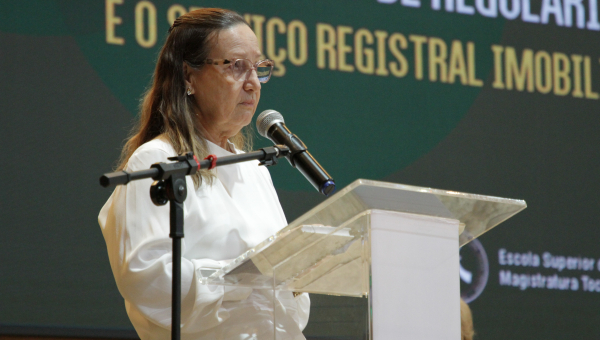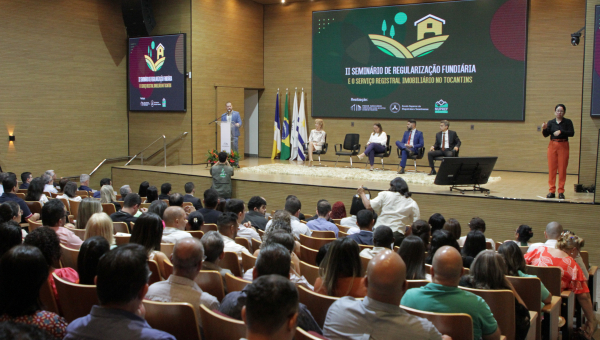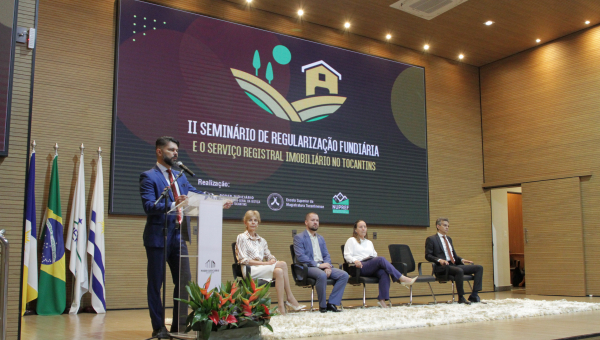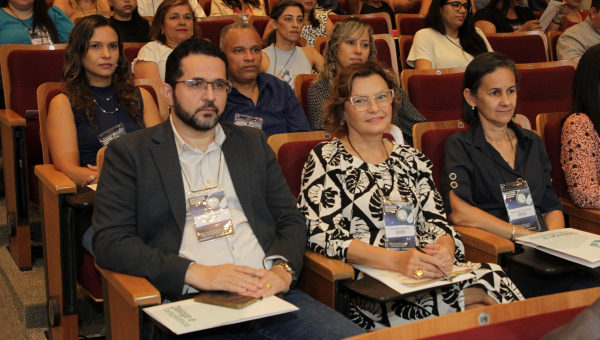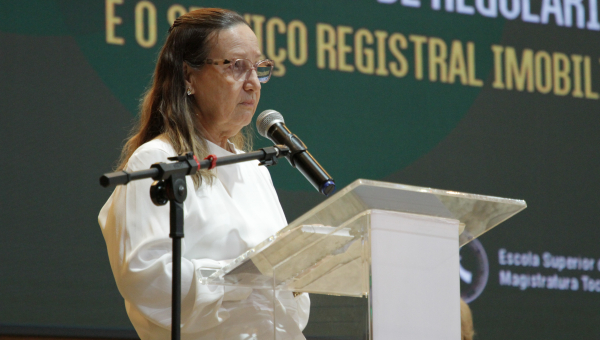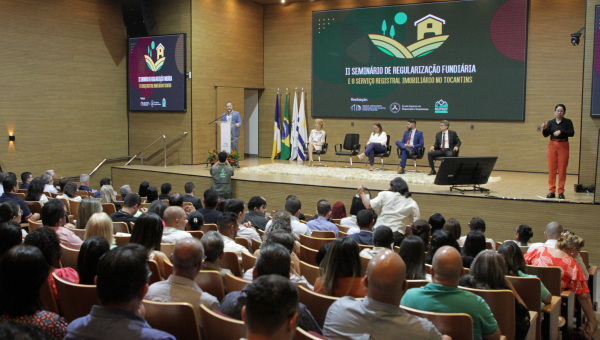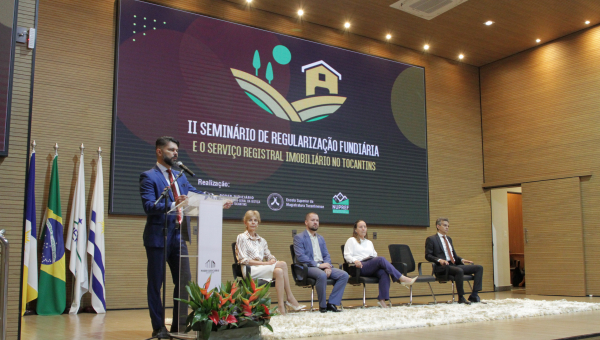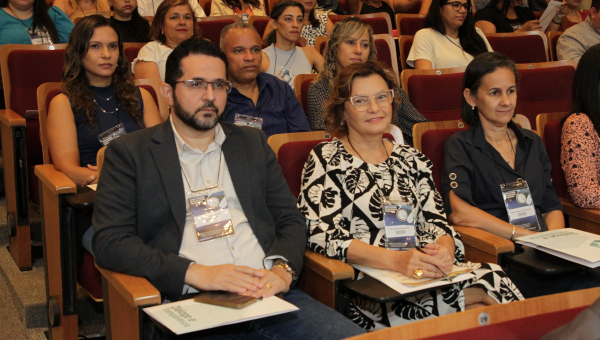
Opening the II Seminar on Land Regularization and the Real Estate Registry Service in the State of Tocantins on Friday morning (August 16th), the President of the National Land Forum and Chief Justice of the State of Tocantins, Justice Maysa Vendramini Rosal, reinforced the commitment of the Judiciary to the social transformation that land regularization can bring about.
“This is a priority issue for our General Internal Affairs Department, given its importance and the need to make further progress. Land regularization is a central issue in guaranteeing the right to decent housing, promoting social inclusion and reducing inequality. It is a fundamental process for development and social justice,” she said.
Land regularization has been one of the focuses of the Judiciary of the State of Tocantins, given the complexity of issues involving possession and ownership of land in the State. In his speech, the coordinator of the Center for Prevention and Land Regularization of the State of Tocantins (Nupref/CGJUS), Judge Wellington Magalhães, highlighted the continuity of the work begun at the first seminar, held in March of 2023, and the importance of institutional partnerships for the success of land regularization initiatives in the State.
“I must emphasize that this is a collective effort, the result of the joint efforts of several institutions, such as the Land Institute of the State of Tocantins,” he said.

The magistrate also emphasized the creation of the Judicial Center for Environmental and Land Conflict Resolution (Cejuscaf), the result of the demand for peaceful and consensual solutions to conflicts in the State of Tocantins. The Judge also expressed the hope that the event would inspire even more commitment to the mission of guaranteeing citizenship and dignity to the population.
“May we leave this second seminar renewed and hopeful about the work that all of us, magistrates, registrars and city hall employees, who work directly in land regularization, do; may we continue to fulfill our mission: to bring citizenship and dignity to people through land regularization.”
Representing the Governor of the State of Tocantins, Wanderlei Barbosa, the President of the Tocantins State Land Institute of the State of Tocantins (Itertins), Robson de Moura Figueiredo Lima, mentioned the commitment of the government to the advancing land regularization, stressing the importance of a joint work between different spheres of government and institutions involved in the process.

“Land regularization is a priority for the state government, and this progress has been treated very seriously. We have held several meetings with the General Internal Affairs Department, because we know how hard everyone is working. However, regularization doesn't happen on its own. It involves the efforts of the municipality, the State and several other institutions, including the registry offices, which have the fundamental role of carrying out the final act of registration,” said Robson.
Testimony
With the aim of empowering and promoting the exchange of knowledge among the professionals in the area, the seminar sought to be a space to strengthen cooperation among the various actors involved in the process of land regularization, such as the real estate register delegates, municipal and state governments, private institutions and civil society.
Among the participants, social worker Cassilda Figueira da Silva revealed, in testimony, the positive impact of the seminar for both its performance and for the team that acts directly in the care of the beneficiary families.
"This event is of extreme importance for us professionals, and for the citizen who needs to have their right guaranteed as property. Our staff operates in housing policy and contributes to the land regularization of housing units of social interest, which is an essential aspect in the process of guaranteeing the right to housing, primordial as a commitment of the regularization to the beneficiary, for the conclusion of the contracts of the housing programs with the Federal Government. Participating in this event has contributed a lot to me as a social area manager," said the social worker, Director of Program and Housing Social Projects at the Secretariat of Cities, Housing and Regional Development (SECIHD).
Basic course of environmental mediation
On the occasion, the graduates of the Basic Course of Environmental Mediation, promoted by the Superior School of the Judges of the State of Tocantins (Esmat), received their certificates of completion. The moment was dedicated to the commitment of the Judiciary of the State of Tocantins to the promotion of environmental justice and the peaceful resolution of conflicts.

The training, divided into theoretical and practical parts, was carried out between 2022 and 2024, had a class load of 100 hours and had as its main objective to train the participants to act in mediation, with a view to consolidate the consensual methods of conflict treatment, in particular mediation and conciliation in environmental matters, social pacification and wide access to justice, the main objectives of the National Judicial Policy for the Adequate Treatment of Conflicts of Interests, established by the Resolution No. 125 of the National Council of Justice, of November 29th , 2010.
Cinthia Barbosa Pires Azevedo, an environmental engineer and a member of the Coordination of Socio-Environmental Management (Coges) of the Court of Justice of the State of Tocantins (TJTO), highlighted the importance of the course for her professional performance.
“The course on environmental mediation was a gift. I had no idea that the content would be so broad and important for land regularization. Esmat and Nupref are committed to provide us with a quality course. We had the opportunity to participate in hearings as observers and as mediators, which gave us a very rich practical experience,” she shared.
The following trainees have completed the course:
Ádria Gomes dos Reis
Aldaires Rodrigues Pacheco
Brenda Sousa
Bruna de Almeida
Cinthia Barbosa Pires Azevedo
Felipe Mansur Pimpão
Helena Maria de Paula Santana
Isley Pereira da Silva
Márcio Augusto da Silva
Mayanne dos Santos Sousa Fonseca
Oliria Morgana Menezes Souza
Waléria Pereira Figueiredo Oliveira
Welica Rodrigues Lemes Barros
Wherbert da Silva Araújo
Presences
In addition to the Justice Maysa Vendramini Rosal, of the President of the State Land Institute of the State of Tocantins, Robson de Moura Figueiredo Lima, and of the Judge Wellington Magalhães, were present at the opening ceremony of the seminar the Law Judge Coordinator of the Permanent Center for Consensual Methods of Conflict Resolution (Nupemec), Silvana Parfieniuk; the President of the Tocantins Partnerships, Aleandro Lacerda; the Secretary of State of Agriculture and Livestock, Jaime Café; and the President of the Association of Magistrates of the State of Tocantins (Asmeto), Allan Martins.




